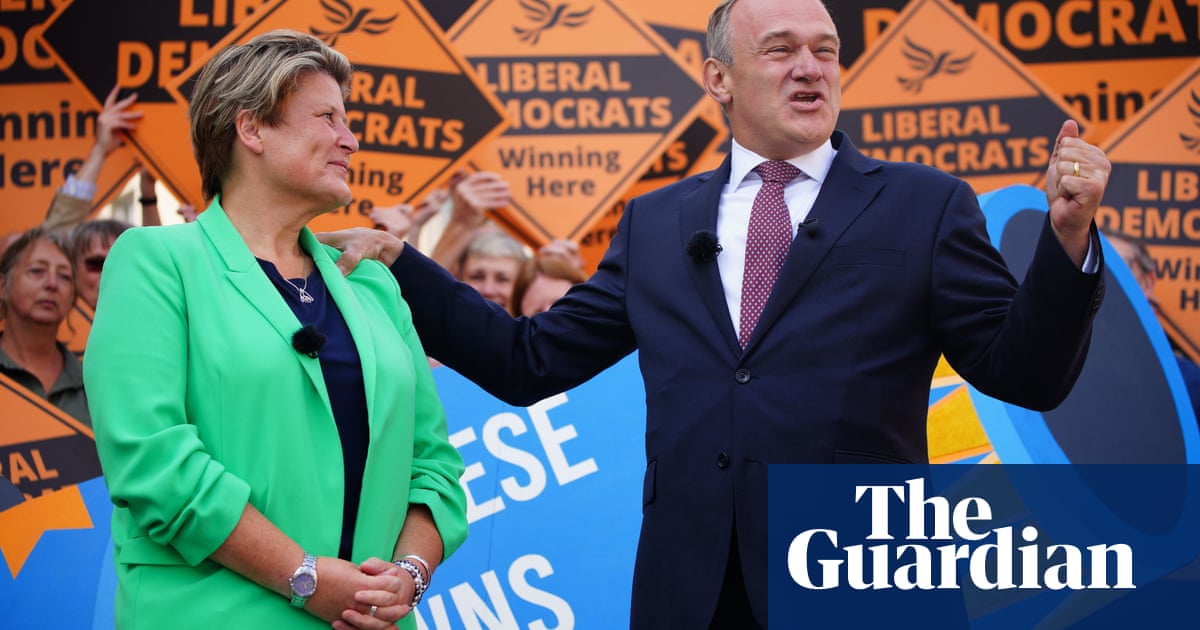
Labour is heading for a landslide win in the election, according to a new projection, but more than 100 Conservative-held seats appear to be on a knife-edge with the results in the hands of millions of undecided or swing voters.
In its first MRP model of the 2024 general election, Ipsos estimated Labour could win 453 seats and the Conservatives 115, giving Keir Starmer’s party a majority of 256 and inflicting the Tories’ worst ever defeat.
The Liberal Democrats could win 38 seats and the Scottish National party 15, three for the Greens and three for Reform UK. According to the projection, Nigel Farage is on track to overturn a huge Tory majority to win in Clacton while Jeremy Corbyn, standing as an independent, is predicted to lose to Labour in Islington North.
Labour has an implied vote share of 43%, with Rishi Sunak’s Tories on 25%, Reform UK on 12%, the Lib Dems on 10%, the Greens on 6%, the SNP on 3% and Plaid Cymru on 1%.
The projection, which represents a 15% swing away from the Tories since 2019, is likely to heighten fears among Conservative candidates and officials that the party could face an “extinction-level event” unless it closes the gap.
However, it is also likely to embolden the Tory strategy of warning of a “super-majority” – which it argues would leave a Labour government unchecked and unaccountable – to try to win back some support.
Almost two weeks from polling day, Labour is still on course to win a substantial majority, reaching the 326 seats mark – even before taking into account those considered on a knife-edge.
The model finds 117 seats, the majority of which were won by the Tories in 2019, are now considered “too close to call” as they have a winning margin of less than five percentage points. They include 56 where the Tories are marginally ahead and 48 where Labour is slightly in the lead.
It underlines the extent to which a relatively small number of undecided voters or switchers to smaller parties, or Labour, could alter the outcome for the Tories. With millions of voters still undecided, the party will be hoping to claw back some support by polling day.
The projection has Sunak’s party falling to a record low of 115 seats, losing votes across the country but notably in areas where the Tories were strongest in 2019, with particularly severe drops in the east and south of England and across the Midlands.
The Conservatives’ worst defeat in modern political history was at the hands of Tony Blair in 1997 when the party won just 165 seats. It collapsed to 156 MPs, or 151 proportional to the size of the Commons, in 1906 – the party’s worst result since it was founded in 1834.
High-profile Tories at risk of losing their seats include Penny Mordaunt, the Commons leader; Gillian Keegan, the education secretary; Grant Shapps, the defence secretary, and Jacob Rees-Mogg.
However, Jeremy Hunt, the chancellor, is predicted to cling on in Godalming and Ash, while Sunak’s Richmond and Northallerton seat is a Conservative hold but on a much-reduced majority, 40% to Labour’s 33%.
Labour’s vote share is increasing across the country, especially in Scotland and north-east England, with more modest advances or even some drops in urban areas where the party has traditionally been strong such as London, Manchester and Birmingham.
While Labour is also picking up only a few more votes in Wales, the party could still gain eight or nine seats there as a result of the decline in Conservative support.
Corbyn, the former Labour leader who lost the party whip, is predicted to lose to Labour, which would pick up 54% of the vote in Islington North, while all independent candidates combined get just 13%.
The Lib Dems are projected to hold on to their eight seats from 2019 as well as gaining at least a further 20 from the Tories, mostly in south-east and south-west England, with another seven too close to call.
Reform UK, meanwhile, is estimated to hang on to Lee Anderson’s Ashfield seat and to take Clacton, where Farage could overturn a massive Conservative majority. North West Leicestershire is also leaning towards Reform, though with a small lead.
Overall, Reform gets its highest share of the vote in the north-east, East Midlands and the east of England. However, Ipsos warned that the Brexit party’s decision not to stand candidates in Tory seats in 2019 meant modelling was more difficult so contested ones could still change.
Farage’s party is coming second in 30 constituencies but most of these are relatively safe Labour seats or Labour wins; four are toss-ups where Reform is challenging the Conservatives.
In Scotland, the fate of the SNP, which took 48 of the 59 Scottish seats in 2019, remains uncertain. Ipsos predicted the SNP would win just 15 of the 57 seats available this time round, losing 29 to Labour and three to the Lib Dems, while eight are too close to call.
The Greens are making headway in Bristol Central, where they are challenging Labour’s Thangam Debbonaire, and North Herefordshire, which is held by the Tories, and are part of a close race in Waveney. However, they could struggle to hold on to Brighton Pavilion, where Labour is ahead.
The Ipsos MRP (multi-level regression and post-stratification) projection, shared with the Guardian, uses a large-scale online survey of nearly 20,000 participants on the random probability Ipsos KnowledgePanel on 7-12 June, and population data at a constituency level, to project which party will win individual seats at the general election.












